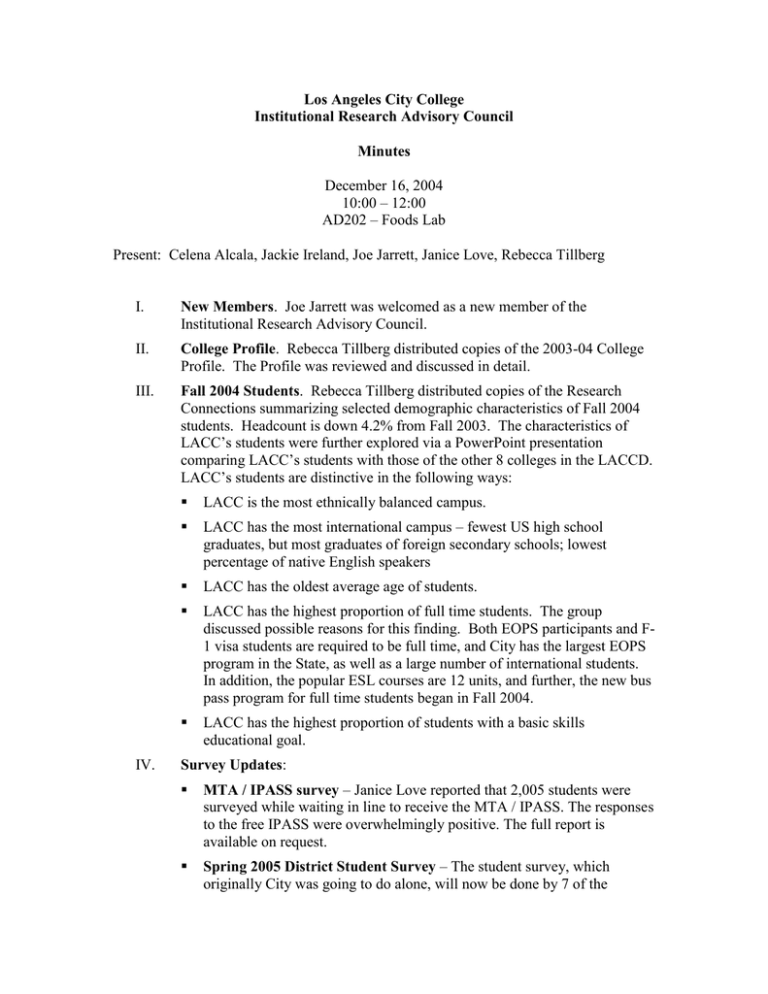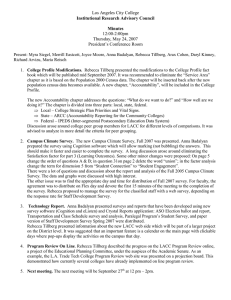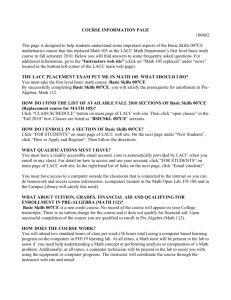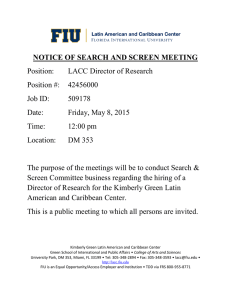December 16, 2004
advertisement

Los Angeles City College Institutional Research Advisory Council Minutes December 16, 2004 10:00 – 12:00 AD202 – Foods Lab Present: Celena Alcala, Jackie Ireland, Joe Jarrett, Janice Love, Rebecca Tillberg I. New Members. Joe Jarrett was welcomed as a new member of the Institutional Research Advisory Council. II. College Profile. Rebecca Tillberg distributed copies of the 2003-04 College Profile. The Profile was reviewed and discussed in detail. III. Fall 2004 Students. Rebecca Tillberg distributed copies of the Research Connections summarizing selected demographic characteristics of Fall 2004 students. Headcount is down 4.2% from Fall 2003. The characteristics of LACC’s students were further explored via a PowerPoint presentation comparing LACC’s students with those of the other 8 colleges in the LACCD. LACC’s students are distinctive in the following ways: IV. LACC is the most ethnically balanced campus. LACC has the most international campus – fewest US high school graduates, but most graduates of foreign secondary schools; lowest percentage of native English speakers LACC has the oldest average age of students. LACC has the highest proportion of full time students. The group discussed possible reasons for this finding. Both EOPS participants and F1 visa students are required to be full time, and City has the largest EOPS program in the State, as well as a large number of international students. In addition, the popular ESL courses are 12 units, and further, the new bus pass program for full time students began in Fall 2004. LACC has the highest proportion of students with a basic skills educational goal. Survey Updates: MTA / IPASS survey – Janice Love reported that 2,005 students were surveyed while waiting in line to receive the MTA / IPASS. The responses to the free IPASS were overwhelmingly positive. The full report is available on request. Spring 2005 District Student Survey – The student survey, which originally City was going to do alone, will now be done by 7 of the LACCD colleges. City will coordinate the survey for the colleges. This change necessitated pushing administration of the survey from the fall to the spring semester. V. Enrollment Updates: Winter 2005 and Spring 2005. EMT reports comparing enrollment and section counts for Winter 2005 with Winter 2004 and for Spring 2005 with Spring 2004 were distributed. Early comparisons showed enrollment down for both terms, and section count up for both terms. The late start of registration may have accounted for the low enrollment, but there is still concern. Brainstorming about how to increase enrollment resulted in several ideas. Janice Love will set up and staff an information table in the breezeway on Vermont, and supply enrollment-related information to passers-by. The class schedule will be made more available at locations around campus. VI. Grade Distribution Reports. Rebecca Tillberg and Janice Love reported on several requests for information related to faculty evaluation. Several grade distribution reports using various approaches to looking at grades were distributed and discussed. Janice described an evaluation of student success in subsequent courses in a sequence based on grades in the prerequisite class, and how one faculty member is using that information in his own self-study. VII. Diversity Scorecard update. Janice Love reported that the diversity scorecard has been renamed ‘Equity Scorecard.’ Her work with the Math Department continues. Professor Robert Rueda from USC’s Education department has begun facilitating discussions with a team from the math department. Robert Rueda and the Math department will meet monthly to explore the issue surrounding math success. VIII. Student Learning Outcomes. Rebecca Tillberg reported that Daryl Kinney has been refining the college-wide core values that were initially developed at a very successful campus open forum in October. Through discussion with many committees and groups on campus, Daryl has grouped the core values into three over-arching areas: Area 1, Essential Academic Skills; Area 2, Personal Growth and Development; Area 3, Interpersonal/ Intercultural/ Global Awareness. Eleven more detailed competencies are included in these 3 areas. IX. Next meeting. The next meeting for IRAC will be Thursday, April 21 at 10:00.


